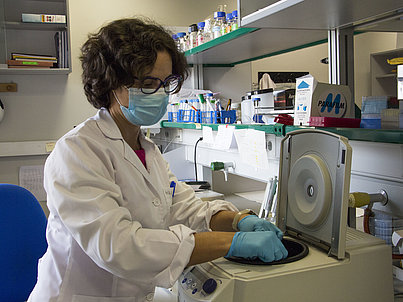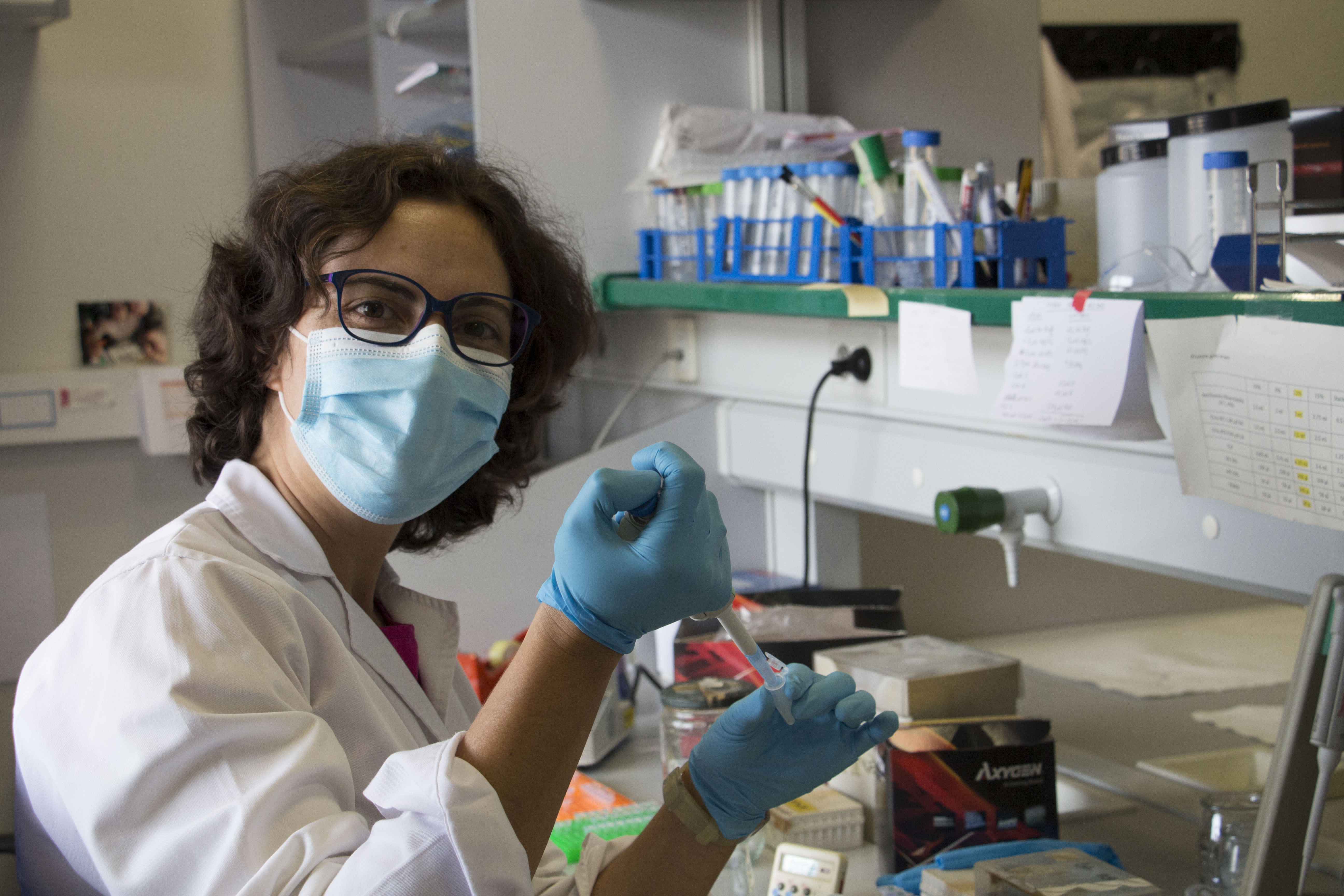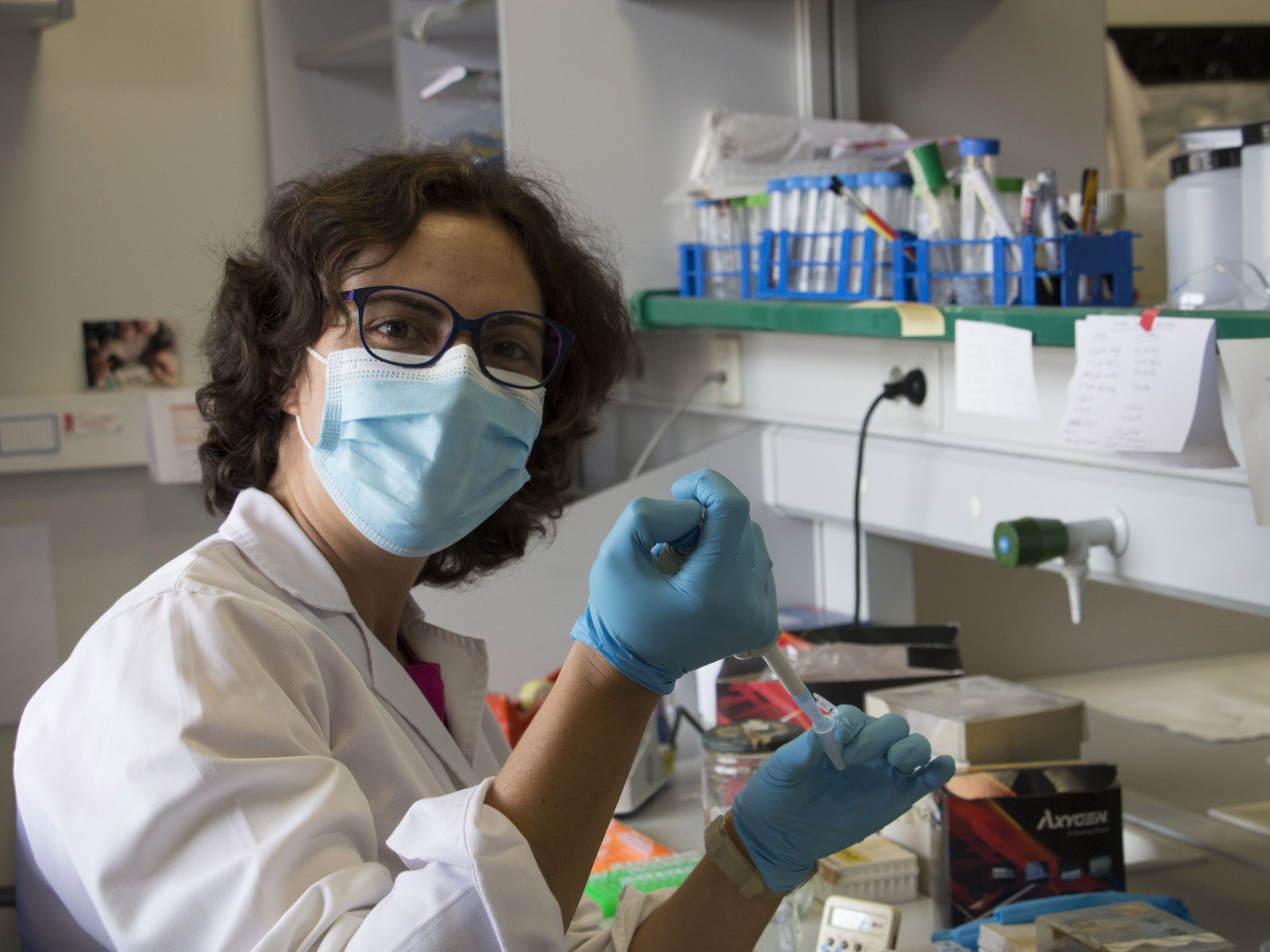The doctor and researcher Rocío López Igual, from the Institute of Plant Biochemistry and Photosynthesis, has been proposed to receive the city medal on September 23 in the category of teaching, educational and research work. This is an award that recognizes the contribution of these people and entities in the most recent history of Seville.
Currently, Rocío works as a researcher at the IBVF, with a prominent scientific career and great milestones behind her, which have led her to be a candidate to receive this award. We take advantage of this recognition to learn more about her career and find out what she is working on now.
Professional career
Before getting to where she is now, Rocío studied Biology at the University of Seville. In 2005, she obtained a Research Personnel Training (FPI) grant that allowed her to do her Thesis at the IBVF under the supervision of Antonia Herrero and Alicia Muro. In her thesis, she worked on the communication between carbon and nitrogen metabolism in cyanobacteria. After defending her thesis, in 2012 she went to France as a PostDoc where she spent several years in different research centers. First, she was at the CEA (Commissariat for Atomic Energy), where she also worked with cyanobacteria. Later, at the Pasteur Institute, Rocío worked on a project on synthetic biology to fight against antibiotic resistance. This is a real and very serious problem, and the overexploitation in the use of these substances has caused resistant bacteria to win battles, and antibiotic treatments to become less and less effective. In this way, Rocío, together with her research group, developed a system capable of detecting pathogenic bacteria within a bacterial population and eliminating them. In addition, this same system is also capable of recognizing antibiotic-resistant bacteria. The research was published in 2019 in Nature Biotechnology, a journal with great international prestige. At that time, at cicCartuja we wanted to publicize this achievement. After her time in France, Rocío López returned to the IBVF to continue her research and has been working in the Developmental Biology in Cyanobacteria group with Enrique Flores, Antonia Herrero and Ignacio Luque. At the same time, she has been asking for her own funding, and has just been accepted into a Ministry project for Young Researchers (JIN) where she will begin working as principal investigator, starting next December.

What motivated you to dedicate yourself to this?
When I was studying Biology I knew I wanted to do my thesis, because I was intrigued by the fact that you could be the one, with your work, to help answer biological questions. Perhaps this desire to investigate was forged during my classes at the University as a student, when the professors, who were also active researchers, relied on experiments published in articles to explain the subjects. When I looked a little deeper, I realized that the articles describe the work of people who, after asking themselves a very interesting question, decided to investigate until they could answer it. This motivation increased when I was an internal student in the Botany department of the Faculty of Biology, where my role was to help several students who were doing their doctoral theses.
And any obstacles that you have encountered in your career?
The main obstacle that exists in science is the lack of funding. This makes it extremely difficult to make a name for yourself in this world with the few opportunities that exist. But not only for young researchers, this funding problem is also the cause of the deterioration of the system at all levels. There are many established research groups that find it difficult to carry out decent research. In fact, on more than one occasion I have considered leaving my career for this very reason. On the other hand, leaving your country without knowing when you will return is also a very difficult situation. In my case, it was several years and thanks to the unconditional support of my family and the people around me (I would like to highlight my husband Joaquín Bernal, who is also a researcher), my stay abroad and my return home became much easier.
Has anyone particularly influenced your career?
At each stage I have been lucky enough to find the right people and this has made my motivation and desire to research grow, taking me from one place to another until I became what I am today.
Why are you being nominated for the 2020 Seville Medal for teaching, education and research?
For my work at the Pasteur Institute that was published in 2019 and had a great scientific impact. In France, the media echoed the news and, as it was done in collaboration with the Complutense University of Madrid, in Spain it also had special recognition.
On the other hand, the project on Biotechnology, with which I begin as a principal investigator at the IBVF and as a professor at the US in a few months, is also of special relevance. In fact, it is the only one for Young Researchers in the branch of Biotechnology that has been given in Spain.
For all this, being nominated to receive the Seville Medal for teaching, education and research work makes me very excited. I am extremely grateful that the Seville City Council gives visibility to my work and supports science.
Tell us what project you are currently working on. What is the objective of your research work?
I am currently working with Enrique Flores on intercellular communication in filamentous cyanobacteria. A project that he has been working on for a long time and I have joined him in the last year to collaborate with him on the research.
And speaking more about your work at cicCartuja, is there anything you like about working at the centre?
I would like to highlight the communication that exists between the different institutes that make up the centre. I have noticed that during my absence the exchange of information between the staff of the three institutes has increased. An example of this is the PhDTalks (http://phd-talks.ciccartuja.es/). It is great to see that on the informative screens, young scientists appear talking about their articles published in scientific journals, or their defence of their theses, etc. This makes us get to know each other better and contribute knowledge, which is not just about sharing a building.
How do you see the current panorama of researchers in Andalusia/Spain?
Honestly, if there is not more investment in research, I fear that the scientific panorama is complicated. Above all, I hope that this exceptional situation caused by Covid-19 is serving some purpose, so that politicians realise the importance of science in our current society. At a time when there is a commitment to accelerating research into vaccines against Covid-19, it is important to remember that sometimes research projects do not advance due to lack of funding. Specifically, I think that we should not stop funding fundamental biology projects, because they lay the foundation for the knowledge necessary to have answers to much more complex questions.
What advice would you give to someone who wants to be a researcher?
The same advice I gave to a student who wrote to me the other day on Research Gate (a social network for researchers). If you like research as much as I do, you will be able to do this job anywhere. Motivation is one of the most important characteristics you need to have in research. In this job you have to put in a lot of hours and work hard, but if you like it, it is very easy to find motivation in any project.




